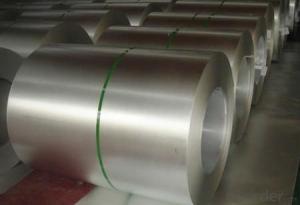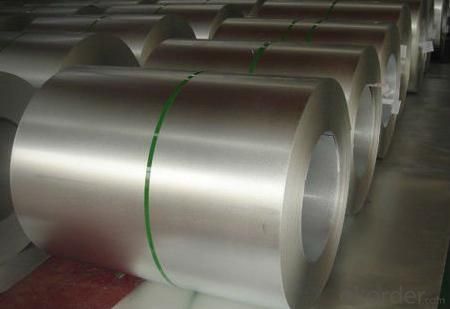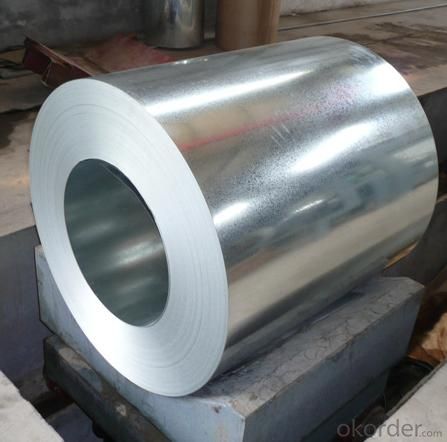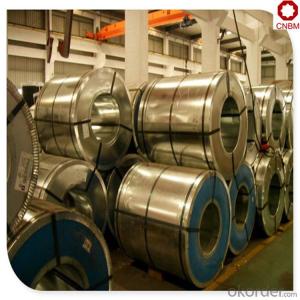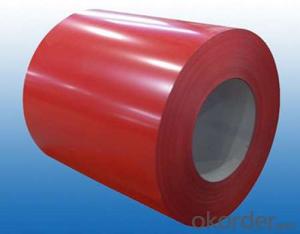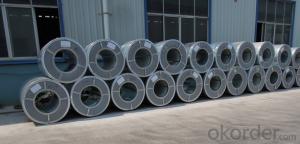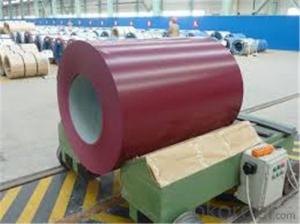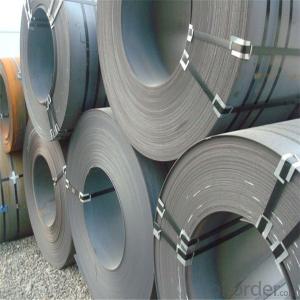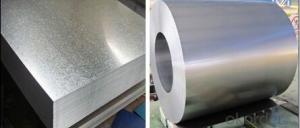Hot Dipped Galvanized Steel Coils -Wear Resistant Steel, High- Strength - Steel Plate
- Loading Port:
- Qingdao
- Payment Terms:
- TT OR LC
- Min Order Qty:
- 25 m.t.
- Supply Capability:
- 10000 m.t./month
OKorder Service Pledge
OKorder Financial Service
You Might Also Like
Quick Details
| Model Number: | 0.13-0.6mm*750-1250mm |
| Material: | SGCH SGCC SPCC DX51D |
| application: | construction,automobile,household ap |
| surface: | galvanized,chromated,dry,skin pass.. |
| skin pass: | chromated |
| technique: | cold rolled |
| spangle: | zero/big/regular/minimum |
| tempering: | bright annealed or full hard |
| grade: | prime |
| zinc coating: | 50-220gsm |
| coil weight: | 3-5mt |
| coil id: | 508mm/610mm |
Packaging & Delivery
| Packaging Detail: | mill's standard packing,sea worthy packing,steel pallets |
| Delivery Detail: | within 15-30 days after received the deposit or the LC at sight |
hot dipped galvanized steel coils
1.FOB:650-1000SUSD/TON
2.size:0.13-0.6mm*750-1250mm*C
3.zinc coating:50-220gsm
4.chromate
hot dipped galvanized steel coils
NAME
| PPGI |
GALVANIZED
|
GALVALUME/ALUZINC
|
CERTIFICATE | ISO9001:2008 | ||
GRADE
| CGCC CGCH CGCD1-CGCD3 CGC340-CGC570 GRADE
| SS GRADE33-80 SGCC SGCH SGCD1-SGCD3 SGC340-SGC570 SGCC DX51D | GRADE33-80 SGLCC SGLCD SGLCDD SGLC400-SGLC570 SZACC SZACH SZAC340R |
MODEL NO | 0.16MM-0.8MM*1250MM OR UNDER | (0.127-1.2*1250MM OR UNDER | 0.12MM-2MM*1250MM OR UNDER |
TYPE
|
Steel coil Steel sheets/plates Corrugated steel sheets/plates
| Steel coil Steel sheets/plates Corrugated steel sheets/plates |
Steel coil Steel sheets/plates Corrugated steel sheets/plates
|
TECHNIQUE |
Ccold rolled -galvalume /galvanized -PPGI/PPGL | Cold rolled - galvanized |
Cold rolled -galvalume /Aluzinc
|
SURFACE TREATMENT | Mini/regular/big/zero spangle, Chromate treatment /chromate-free treatment /untreated unoile/oiled, TENSION LEVELLERT SKIN PASS anti-fingerprint/un-anti-fingerprint, Coating,color
| Mini/regular/big/zero spangle, Chromate treatment /chromate-free treatment /untreated unoile/oiled, TENSION LEVELLERT SKIN PASS anti-fingerprint/un-anti-fingerprint, Coating
| |
APPLICATION | Structural use ,roofing, commercial use, household appliance, industry, family
| ||
SPECIAL APPLICATION | Wear resistant steel, high- strength - steel plate | ||
- Q: What are the different methods of punching steel coils?
- There are several different methods used for punching steel coils, depending on the specific requirements and desired outcome. Here are a few common methods: 1. Mechanical Punching: This method involves using a mechanical press to apply force and create holes in the steel coil. It utilizes a punch and die set, where the punch is driven into the coil to create the hole. Mechanical punching is ideal for punching small to medium-sized holes and is often used in high-volume production settings. 2. Hydraulic Punching: Hydraulic punching utilizes hydraulic pressure to drive the punch into the steel coil. This method is often used for punching larger holes or shapes that require greater force. Hydraulic punching machines offer precise control and can handle thicker and harder materials. 3. Laser Cutting: Laser cutting is a non-contact method that uses a laser beam to cut through the steel coil. A focused laser beam is directed onto the coil, melting and evaporating the material to create the desired shape or hole. Laser cutting offers high precision and can be used for complex shapes and patterns. 4. Plasma Cutting: Plasma cutting involves using a high-velocity jet of ionized gas (plasma) to melt and remove the steel coil material. This method is suitable for cutting thicker steel coils and is often used for larger holes or irregular shapes. 5. Waterjet Cutting: Waterjet cutting utilizes a high-pressure jet of water mixed with abrasive particles to cut through the steel coil. This method is versatile and can effectively cut through various materials, including steel. Waterjet cutting is known for its high precision and clean cuts. Each method of punching steel coils has its own advantages and considerations. Factors such as material thickness, desired precision, production volume, and cost will determine the most suitable method for a specific application.
- Q: What are the dimensions of steel coils used in the agricultural equipment industry?
- The dimensions of steel coils used in the agricultural equipment industry vary depending on the specific application and requirements of the equipment. However, some common dimensions for steel coils used in this industry range from 0.5mm to 6mm in thickness and 600mm to 2000mm in width. The length of the coils can be customized based on the needs of the specific equipment. Additionally, the weight of the coils can also vary, typically ranging from a few hundred kilograms to several tons. It is important to note that these dimensions are not fixed and may vary depending on the manufacturer and the specific agricultural equipment being produced.
- Q: steel bollard poles?
- They're short steel posts that are used as a barrier to keep traffic out of an area. If you want to see an example Google it and look at the pics.
- Q: How are steel coils used in the production of electrical systems?
- Steel coils are used in the production of electrical systems as they serve as the key component in the construction of transformers and electric motors. These coils are wound with insulated copper wire and when an electric current passes through them, they generate a magnetic field that enables the conversion of electrical energy into mechanical energy or vice versa.
- Q: How do steel coil manufacturers meet customer specifications?
- Steel coil manufacturers meet customer specifications by following a comprehensive and systematic approach that involves various stages and processes. Here are some key steps they take: 1. Understanding customer requirements: Manufacturers initiate the process by thoroughly understanding the specific requirements of their customers. This includes determining the desired dimensions, tolerances, mechanical properties, surface finish, and any other specific characteristics needed. 2. Material selection: Based on the customer's requirements, manufacturers select the appropriate type and grade of steel to meet their specifications. This involves considering factors such as strength, corrosion resistance, formability, and cost-effectiveness. 3. Production planning: Manufacturers carefully plan their production processes to ensure that customer specifications are met. This involves determining the appropriate manufacturing techniques, equipment, and resources required. 4. Coil processing: Steel coils are processed through various stages such as hot rolling, cold rolling, annealing, pickling, and coating, depending on the customer's specifications. Each step is carefully controlled to achieve the desired properties and dimensions. 5. Quality control: Throughout the manufacturing process, strict quality control measures are implemented to ensure that the coils meet the customer's specifications. This includes regular inspections, testing, and compliance with industry standards. 6. Customization and flexibility: Steel coil manufacturers often offer customization options to meet specific customer needs. They have the capability to adjust the thickness, width, and length of the coils to match the desired specifications. 7. Communication and collaboration: Effective communication and collaboration between the manufacturer and the customer are crucial to meeting specifications. Manufacturers work closely with their customers to address any concerns or modifications required during the manufacturing process. 8. Documentation and certification: Once the steel coils are manufactured, manufacturers provide detailed documentation and certifications to ensure traceability and compliance with customer specifications. This includes providing test reports, material certificates, and any other necessary documentation. By following these steps, steel coil manufacturers can consistently meet customer specifications, ensuring that the final product meets the desired requirements and quality standards.
- Q: I'm analysing horse stirrups and would like to know the disadvantages to stainless steel? - thanks
- For horse stirrups the main disadvantage to stainless steel is the manufacturing cost. Stainless steels tend to work harden, and are subject to their own peculiar forms of corrosion, but I see little implication to either of these factors when used as a stirrup iron or a safety latch. Stainless steel is also subject to self welding, or galling, this would be of no concern for the irons, but could result in the pivot of the safety latch freezing (I have never known anyone to ride with the safety latch closed, however).
- Q: In what ways can steel fail in use of buildings ad what can be done to prevent it?
- I am a secretary at a Steel panel making company! But I still can't help you. :(
- Q: As we all know Shaq killed the movie Steel by suckin so bad but does anyone know what happened to the comic book version.
- Addendum to the previous answer - although he doesn't have his own comic currently, John Henry Irons still appears in comics, most recently in several issues of 52.
- Q: How are steel coils used in the production of solar panels?
- Steel coils are not directly used in the production of solar panels. However, steel is typically used in the manufacturing of the structural frames and mounting systems for solar panels. These frames and mounting systems provide support and stability to the solar panels, ensuring their proper installation and long-term durability.
- Q: Its big and expensive and i don't know if it would have a logical purpose but its sharp as hell and awesome. Anyways, its made from surgical steel and all i have found on the internet is that its probably 316L (w/e that means). I have another knife made from 440 stainless steel and as far as i know that is pretty much the hardest stainless metal. So why would the more expensive one be made from surgical steel?
- This Site Might Help You. RE: Why would a knife be made from surgical steel? Its big and expensive and i don't know if it would have a logical purpose but its sharp as hell and awesome. Anyways, its made from surgical steel and all i have found on the internet is that its probably 316L (w/e that means). I have another knife made from 440 stainless steel and...
Send your message to us
Hot Dipped Galvanized Steel Coils -Wear Resistant Steel, High- Strength - Steel Plate
- Loading Port:
- Qingdao
- Payment Terms:
- TT OR LC
- Min Order Qty:
- 25 m.t.
- Supply Capability:
- 10000 m.t./month
OKorder Service Pledge
OKorder Financial Service
Similar products
Hot products
Hot Searches
Related keywords
